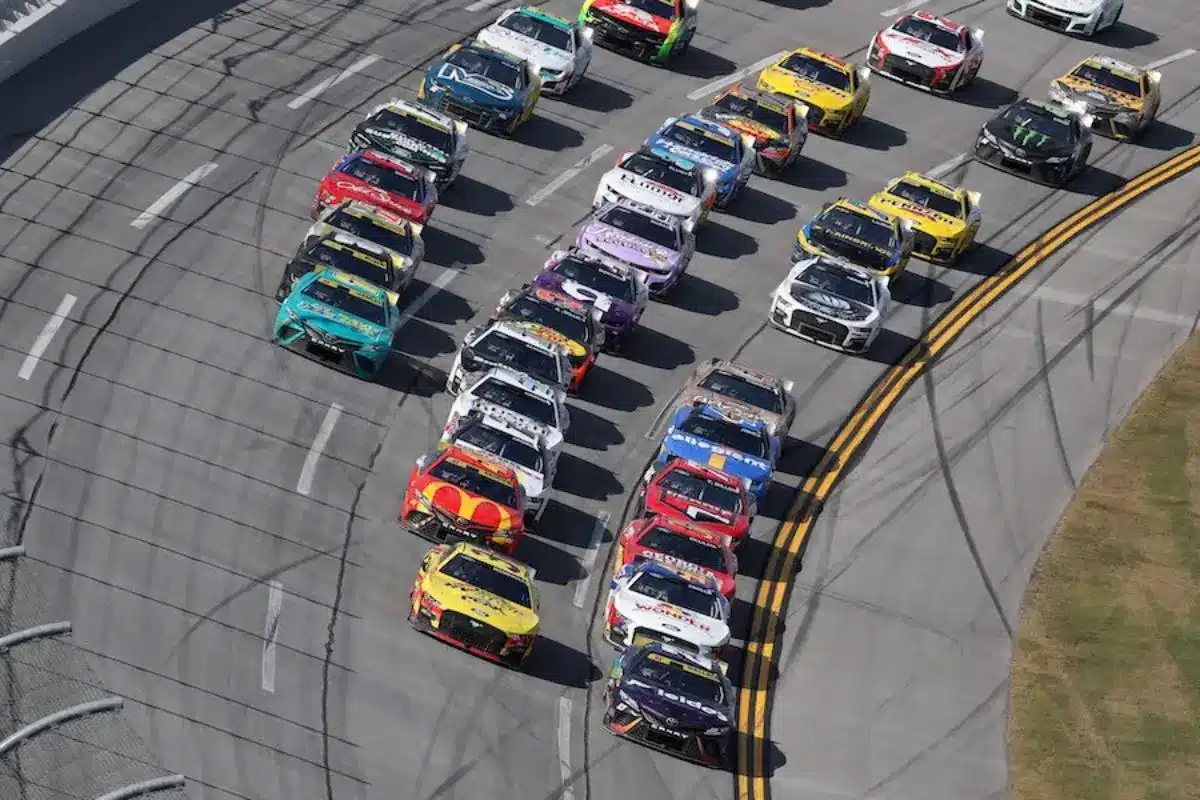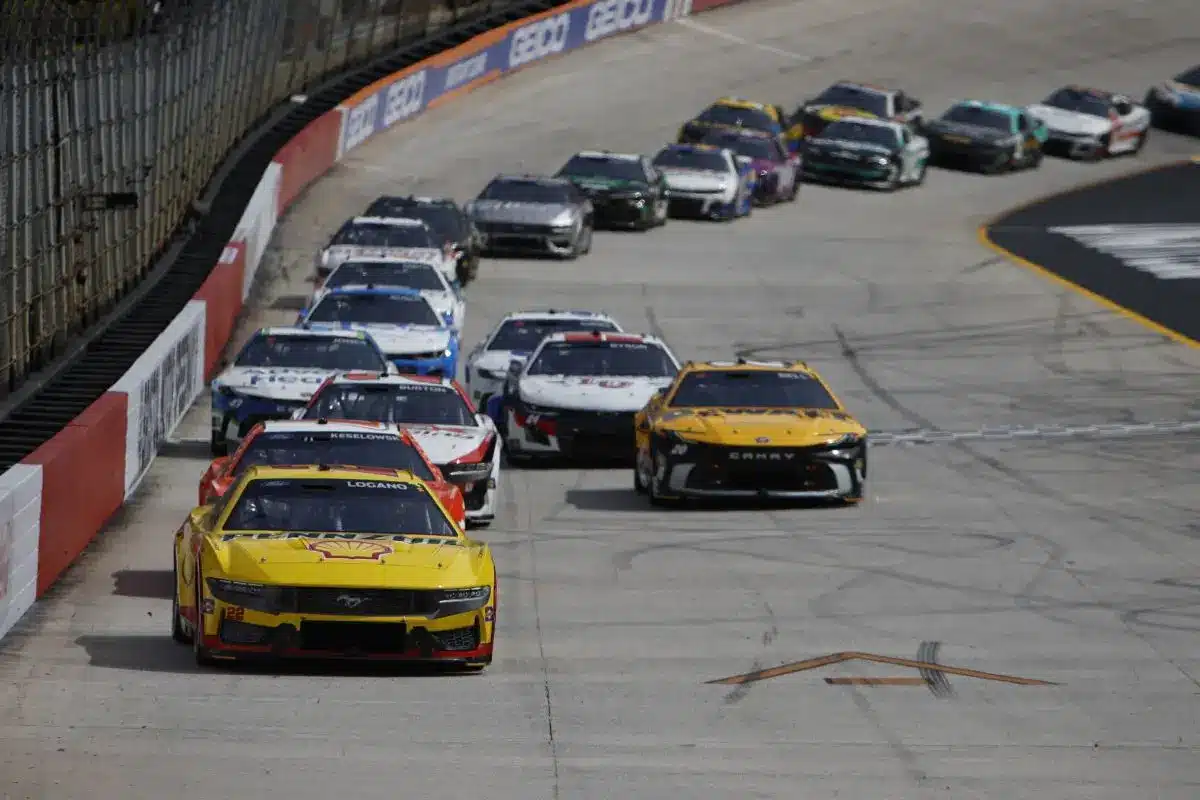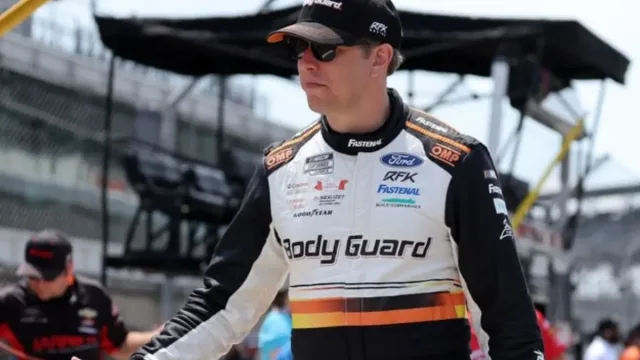Brad Keselowski warns NASCAR’s future hangs in the balance as a major lawsuit stirs up uncertainty across the sport. The ongoing charter dispute could reshape how teams operate, creating questions about fairness, money, and competition. Insider Bob Pockrass adds even more drama, revealing changes that could shake NASCAR to its core. What’s at stake for drivers, teams, and fans?
Key Highlights
- Brad Keselowski warns that the antitrust lawsuit could destabilize the current NASCAR financial structure and team sustainability.
- He highlights that changes in revenue-sharing models may negatively impact smaller teams, exacerbating competitive balance issues.
- Keselowski expresses concern that the lawsuit’s outcome could lead to significant shifts in NASCAR governance and team dynamics.
- The potential removal of the charter system may result in heightened competition but also increased financial pressure on teams.
- Legal precedents set by the lawsuit could shape NASCAR’s operations and governance for years to come.
Antitrust Lawsuit
As the antitrust lawsuit filed by 23XI Racing and Front Row Motorsports unfolds, it poses considerable challenges to NASCAR’s operational framework. At the heart of the legal implications lies the dispute that NASCAR’s charter and revenue distribution agreements are monopolistic, fundamentally undermining fair competition among teams.
The lawsuit raises critical questions about NASCAR governance, particularly with respect to how revenue is allocated among participating teams.
With 23XI Racing and FRM opting to challenge the established system rather than adhere to agreements signed prior to the 2024 playoffs, team dynamics have become increasingly argumentative. This situation has the potential to alter the competitive landscape of NASCAR, as the outcomes may redefine how teams interact and collaborate within the sport.
Moreover, fan reactions to the lawsuit have been mixed, with some expressing concerns about the integrity of the sport and others supporting the plaintiffs’ quest for equitable treatment.
The consequences of this lawsuit extend beyond immediate financial impacts, as they could reshape the future of NASCAR, influencing not only governance policies but also the comprehensive perception of fairness within the sport.

Brad Keselowski’s Concerns About the Lawsuit
While discussing the implications of the antitrust lawsuit, Brad Keselowski expressed considerable concerns regarding its potential to disrupt not only the NASCAR Cup Series but the broader NASCAR framework. His predictions highlight the critical nature of the ongoing charter dispute involving 23XI, Front Row Motorsports, and NASCAR, emphasizing the profound charter consequences for all teams within the ecosystem.
“Well, I would say there’s one A and one B that are the two biggest threats for me. One is whatever falls out of the charter lawsuit dispute between 23XI, Front Row Motorsports, and NASCAR. That is a significant threat to all of NASCAR, which transcends the Cup Series.” – Brad Keselowski
- Team sustainability could be threatened by shifts in financial structures.
- Financial outcomes may arise from a reevaluation of revenue-sharing models.
- Sport evolution could be stunted by restrictive regulations stemming from the lawsuit.
- Competitive balance may be undermined, affecting smaller teams disproportionately.
- Legal precedents set by this case could influence future NASCAR governance.
Keselowski articulated that a favorable outcome for FRM and 23XI could reshape negotiation dynamics, permitting other teams to secure better terms with NASCAR.
He warns that the repercussions extend beyond immediate financial concerns; they could fundamentally alter team sustainability and competitive equity.
Bob Pockrass’ Insights on the Lawsuit’s Impact
Given the potential consequences of the antitrust lawsuit, Bob Pockrass offered valuable insights into its possible effects on NASCAR’s operational framework. He emphasized that the lawsuit could considerably redefine NASCAR team dynamics, particularly concerning the fixed-cost structure currently imposed by the governing body.
Pockrass noted that if the lawsuit led to favorable outcomes for the teams, they might experience considerable cost structure changes, allowing for greater team resource flexibility. This shift could enable teams to invest varying amounts in their vehicles, deviating from the established norms dictated by NASCAR.
“I don’t know about a threat as much as the potential impact of the way the sport is run… They (teams) see that (fixed cost of next-gen cars) as a key element. They don’t have the next-gen car and that way (if NASCAR loses lawsuit) the teams can spend you know as much money or as little money as they want on a car.” – Bob Pockrass
As Pockrass articulated, the implications of the lawsuit extend beyond mere financial considerations; they may also instigate competitive landscape shifts within the sport. Teams that currently operate under a rigid cost model may find themselves empowered to allocate resources tactically, nurturing a more competitive environment.
The potential for increased resource allocation could lead to disparities in performance, as teams innovate and optimize their operations. Altogether, Pockrass’s analysis highlights the importance of the lawsuit, suggesting that its outcome could catalyze groundbreaking changes within NASCAR, affecting not only team operations but also the competitive balance of the sport itself.
 Rick Ware Racing 3″ width=”1200″ height=”800″ srcset=”https://slicksandsticks.com/wp-content/uploads/2024/09/NASCRA-Cup-Series-Driver-Standings-After-Bristol.webp 1200w, https://slicksandsticks.com/wp-content/uploads/2024/09/NASCRA-Cup-Series-Driver-Standings-After-Bristol-300×200.webp 300w, https://slicksandsticks.com/wp-content/uploads/2024/09/NASCRA-Cup-Series-Driver-Standings-After-Bristol-1024×683.webp 1024w, https://slicksandsticks.com/wp-content/uploads/2024/09/NASCRA-Cup-Series-Driver-Standings-After-Bristol-768×512.webp 768w, https://slicksandsticks.com/wp-content/uploads/2024/09/NASCRA-Cup-Series-Driver-Standings-After-Bristol-630×420.webp 630w, https://slicksandsticks.com/wp-content/uploads/2024/09/NASCRA-Cup-Series-Driver-Standings-After-Bristol-150×100.webp 150w, https://slicksandsticks.com/wp-content/uploads/2024/09/NASCRA-Cup-Series-Driver-Standings-After-Bristol-696×464.webp 696w, https://slicksandsticks.com/wp-content/uploads/2024/09/NASCRA-Cup-Series-Driver-Standings-After-Bristol-1068×712.webp 1068w” sizes=”auto, (max-width: 1200px) 100vw, 1200px” />
Rick Ware Racing 3″ width=”1200″ height=”800″ srcset=”https://slicksandsticks.com/wp-content/uploads/2024/09/NASCRA-Cup-Series-Driver-Standings-After-Bristol.webp 1200w, https://slicksandsticks.com/wp-content/uploads/2024/09/NASCRA-Cup-Series-Driver-Standings-After-Bristol-300×200.webp 300w, https://slicksandsticks.com/wp-content/uploads/2024/09/NASCRA-Cup-Series-Driver-Standings-After-Bristol-1024×683.webp 1024w, https://slicksandsticks.com/wp-content/uploads/2024/09/NASCRA-Cup-Series-Driver-Standings-After-Bristol-768×512.webp 768w, https://slicksandsticks.com/wp-content/uploads/2024/09/NASCRA-Cup-Series-Driver-Standings-After-Bristol-630×420.webp 630w, https://slicksandsticks.com/wp-content/uploads/2024/09/NASCRA-Cup-Series-Driver-Standings-After-Bristol-150×100.webp 150w, https://slicksandsticks.com/wp-content/uploads/2024/09/NASCRA-Cup-Series-Driver-Standings-After-Bristol-696×464.webp 696w, https://slicksandsticks.com/wp-content/uploads/2024/09/NASCRA-Cup-Series-Driver-Standings-After-Bristol-1068×712.webp 1068w” sizes=”auto, (max-width: 1200px) 100vw, 1200px” />
NASCAR’s Consideration of Operating Without Charters
The ongoing discussions surrounding the antitrust lawsuit have prompted NASCAR to investigate the possibility of operating without a charter system, which could fundamentally alter the landscape of the sport.
“You know, during the hearing the other day, NASCAR would be willing to go without Charters totally. So, I think that is uncertainty probably is you know what has people wondering okay will this lawsuit have a big impact or no. It may have very little impact depending on what the result is, but it does have the potential to change a little bit of the way the sport is run.” – Bob Pockrass
This potential shift raises crucial questions regarding team dynamics, financial implications, and competitive balance within NASCAR.
- Elimination of the charter system could lead to increased competition, as every team would basically become a free agent.
- Teams would face the challenge of securing sponsorships and funding without guaranteed entry into races.
- Driver opportunities might expand, allowing more talent to enter the sport without the constraints of charter ownership.
- Financial implications could be considerable, potentially reducing the financial safety net currently provided by the charter system.
- NASCAR would need to reassess how it maintains competitive balance among teams, ensuring that all participants have a fair shot at success.
As NASCAR contemplates these changes, the implications for the sport’s future could reshape how it operates, impacting everything from team survival to driver recruitment.
Recent Developments and FRM’s New Sponsorship Deals
Tactical foresight is apparent in Front Row Motorsports’ (FRM) recent initiatives, particularly as they navigate the complexities of the current NASCAR landscape. The team’s calculated moves, especially in securing new sponsorship deals, highlight their adaptability within evolving sponsorship dynamics. With the ongoing lawsuit regarding charter recognition, FRM has taken proactive steps to strengthen its team strategy and improve driver performance.
By including Speedy Cash and TitleMax as primary sponsors for Zane Smith, FRM aims to utilize market trends and optimize financial implications. These sponsors will debut at crucial races, boosting visibility while reinforcing their commitment to the team’s success. Furthermore, the partnership with Zep to support Noah Gragson’s No. 4 Ford Mustang demonstrates a commitment to associate sponsorships that can amplify brand exposure across multiple platforms.
 Chevrolet’s Plan to Retain Camaro in NASCAR 2″ width=”1200″ height=”800″ srcset=”https://slicksandsticks.com/wp-content/uploads/2024/09/Bass-Pro-Shops-Night-Race-2024-Full-Results.webp 1200w, https://slicksandsticks.com/wp-content/uploads/2024/09/Bass-Pro-Shops-Night-Race-2024-Full-Results-300×200.webp 300w, https://slicksandsticks.com/wp-content/uploads/2024/09/Bass-Pro-Shops-Night-Race-2024-Full-Results-1024×683.webp 1024w, https://slicksandsticks.com/wp-content/uploads/2024/09/Bass-Pro-Shops-Night-Race-2024-Full-Results-768×512.webp 768w, https://slicksandsticks.com/wp-content/uploads/2024/09/Bass-Pro-Shops-Night-Race-2024-Full-Results-630×420.webp 630w, https://slicksandsticks.com/wp-content/uploads/2024/09/Bass-Pro-Shops-Night-Race-2024-Full-Results-150×100.webp 150w, https://slicksandsticks.com/wp-content/uploads/2024/09/Bass-Pro-Shops-Night-Race-2024-Full-Results-696×464.webp 696w, https://slicksandsticks.com/wp-content/uploads/2024/09/Bass-Pro-Shops-Night-Race-2024-Full-Results-1068×712.webp 1068w” sizes=”auto, (max-width: 1200px) 100vw, 1200px” />
Chevrolet’s Plan to Retain Camaro in NASCAR 2″ width=”1200″ height=”800″ srcset=”https://slicksandsticks.com/wp-content/uploads/2024/09/Bass-Pro-Shops-Night-Race-2024-Full-Results.webp 1200w, https://slicksandsticks.com/wp-content/uploads/2024/09/Bass-Pro-Shops-Night-Race-2024-Full-Results-300×200.webp 300w, https://slicksandsticks.com/wp-content/uploads/2024/09/Bass-Pro-Shops-Night-Race-2024-Full-Results-1024×683.webp 1024w, https://slicksandsticks.com/wp-content/uploads/2024/09/Bass-Pro-Shops-Night-Race-2024-Full-Results-768×512.webp 768w, https://slicksandsticks.com/wp-content/uploads/2024/09/Bass-Pro-Shops-Night-Race-2024-Full-Results-630×420.webp 630w, https://slicksandsticks.com/wp-content/uploads/2024/09/Bass-Pro-Shops-Night-Race-2024-Full-Results-150×100.webp 150w, https://slicksandsticks.com/wp-content/uploads/2024/09/Bass-Pro-Shops-Night-Race-2024-Full-Results-696×464.webp 696w, https://slicksandsticks.com/wp-content/uploads/2024/09/Bass-Pro-Shops-Night-Race-2024-Full-Results-1068×712.webp 1068w” sizes=”auto, (max-width: 1200px) 100vw, 1200px” />
News in Brief: Brad Keselowski Warns NASCAR’s Future Hangs in the Balance
The ongoing antitrust lawsuit poses substantial challenges for NASCAR, as highlighted by Brad Keselowski’s warnings regarding potential consequences for the sport. Insights from industry expert Bob Pockrass emphasize the lawsuit’s potential to alter NASCAR’s operational structure, particularly the consideration of running without charters.
Recent developments, including new sponsorship deals for Front Row Motorsports, indicate a shifting landscape, suggesting that stakeholders must navigate complex legal and economic factors to guarantee the future viability of the sport.
ALSO READ: “Food Brings People Together”: How Brad Keselowski Builds Team Culture with His Personal Duties
